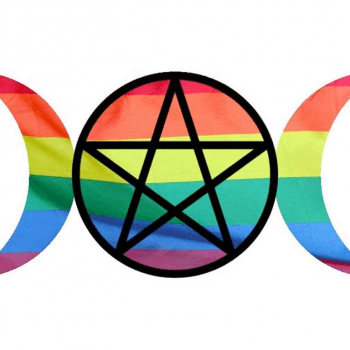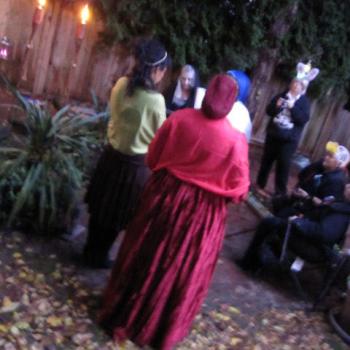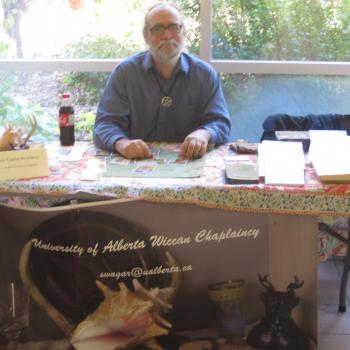
The intellect makes sense of an experience or work of art, but it does not make meaning. As religion is primarily in the business of making meaning, rather than making knowledge or sense, the structuring done on the level of ritual performance is the primary experience, and the codification of it is secondary. This is particularly true because religious beliefs are relatively unstable and unsystematic for lay people and most religions are not well-worked out and logical but little more than collections of notions, unstable and non-systematic aggregates of ideas, whereas most people are pretty well versed in ritual performance details. What is truly meaningful becomes part of life, informing and inspiring action beyond the purely spiritual realm.
The absolute ground zero of our religion needs to be the ecstatic direct experience of the Gods, in the Mysteries work in the covens. Although most of the laity will only experience the halo of it – the presence revealed dimly in and through the public Temple ritual, embodied in the community of worshippers and through the ritual leaders – that is nonetheless central. For clergy of temples the minimum requirement of a 2nd degree initiation and the expectation of ecstatic direct experience through trance both mean that they will bring the Gods into ritual through their bodies and share part of the charism with everyone else. Ritual cannot merely be theatre but must remain a vehicle through which the genuine presence of deity can be experienced.

A good deal of attention must be given to training in ritual composition and performance at all levels and to involving many of the laity in its performance as well. It is highly likely that many of the people that are interested in checking out Wicca will find themselves at an open circle hosted by a public Temple, if there is one in their community. So public ritual with a strong sense of belonging, togetherness and community, which is dynamic and stirs and inspires the people who participate in it to feel helped and hopeful as a consequence, will be a factor in bringing people to become more involved. I should refer you, gentle reader, to my series of posts on ritual and to my book Creating Lore, Writing Ritual.
Although our Temples and public groups cannot only be the property of a coven, as in the typical Inner Court / Outer Court division, but must be run by their members and constantly birthing new groups, the clergy must be anchored in coven, and the Mysteries practises of covens are essential. In practical terms, as well, the tight bonds and mutual responsibility of coven work is a good model of communitas and a practical bond to bring together the working core groups of the Temples.
By distilling the theological messages to essentials, adopting a cell-like structure, abandoning unnecessary ecclesiastic and theological sophistication and clinging to the central message and experience of the religion, we facilitate rapid reproduction and networking. Rapid transmission can happen along relational lines – with friends and family bringing each other to get involved. It is not complicated and does not take a great deal of study to master the foundation ideas of Wicca. The whole point is rapid growth and contagious ideas with elaboration in ethics and practices to be worked out on the local and individual level, facilitated by the communities that grow around the Temples and the expertise of the clergy and lay leaders. By the adoption of a movement orientation and encouraging free flow of information and discussion, theological and ritual innovation can be encouraged without being the exclusive property of one group or ‘teacher’ or contained in one set of scriptures.

Although the ideas are simple it should be difficult to join a coven, difficult to qualify for Initiation, but simple to participate in it once in. Participation in Temple activities, which are basically an Outer Court version of the teachings and rituals, must be even more approachable. This doesn’t mean that we do not speak of profound or important things, but that we do so through the simplest language and with the most direct means possible and that we consider liturgy and ritual development and performance vitally important. We also understand the importance and difficulty of character training, of discipleship, in building the foundation for our religious service, in particular as clergy.
We are not interested in a consumerist approach – the medium is the message, the experience will unfold meaning to the person who has it, although not immediately and only with genuine effort. Consumerism reduces religion to a commodity, and ultimately to money alone, so we do not charge money nor provide simple study guides to ritual and theology as a substitute for experience and effort. The experiences of meaning through effectively performed and well-thought-out ritual need to unfold over time and with repeated exposure and personal reflection. We aim to produce in ourselves a shared set of understandings about the way the spiritual intersects with the world, and a set of habits of virtue and ways of responding to it. We are not selling information and a quick key to enlightenment and personal efficacy, but, if we are lucky, building together a movement based on self-governed small groups and individuals who support each other in making meaning and acting in the world in tune with that meaning.
The key goal in our religion and in our church is assisting individuals to become like the Gods – establishing the conversation of our Holy Guardian Angel and finding the Goddesses and Gods that want to work with us individually and also collectively. We must live our values, acting in all parts of our lives as the embodiment of the good and the virtues. Modelling by the leaders is crucially important in the development of the laity and of subsequent groups of leaders. Inspiriting leadership rather than exclusively institutionally recognized leadership is important – although the Ordination process and some leadership needs to be formalized, the inspiration of the Gods can strike and empower lay leaders as well. The institutional marking is for functional purposes, to keep the organization rolling, but the quality of the church’s leadership is directly proportional to the quality of this embodiment. If the church fails in this key task of assisting people to embody their Gods, then it will fail in all other aspects of leadership development. And leadership is essential.













